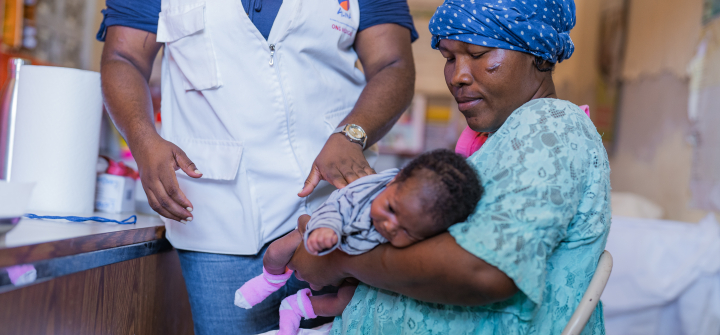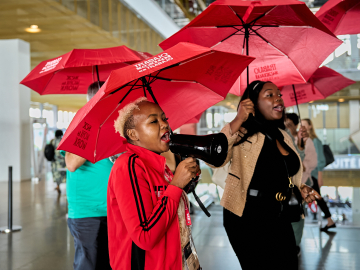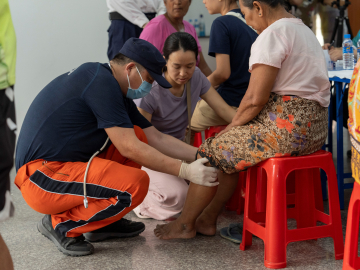We Must Safeguard the Health of Haiti’s Women and Girls
The escalating humanitarian crisis in Haiti underscores a tragic reality of violence and displacement. After years of turmoil and attempts to rebuild, the chaos has worsened, driven by increasing attacks from armed groups and political instability. By early June, 578,074 people have been forced from their homes. More than half of them are women and girls—and their health is increasingly at risk.
The destruction of Haiti’s health system has left women and girls especially vulnerable to maternal mortality, unintended pregnancies, and severe health complications. This systemic failure highlights the urgent need for a comprehensive approach to health care that addresses gaps and prioritizes the needs of those who are often most impacted by conflict.
As a stark indicator of these and other challenges, the country currently has the highest maternal and infant mortality rates in the Western Hemisphere—and nearly 85,000 pregnant women, according to the UNFPA.
Violence is only deepening this crisis. Security issues hinder consistent care delivery, and logistical barriers complicate coordination. Scaling services is nearly impossible because resources remain scarce. Many hospitals and clinics are shuttered, and humanitarian organizations are struggling to provide access to quality prenatal, neonatal, and maternal care.
In times of instability, such as conflict, natural disasters or epidemics, reproductive care is often the first to be disrupted. The people who rely on these services are then left even more susceptible to severe health risks and compounding crises.
ALIMA (the Alliance for International Medical Action) is addressing some of these challenges by bringing care directly to women and girls. Our mobile clinic has reached more than 2,000 people since March, and our team sees around eight pregnant women per day at internally displaced persons (IDP) sites.
One of those women was Samedi Modeline. In early 2024, amid the escalating violence between police and armed groups, Modeline's life in Cité Soleil took a devastating turn. The clashes left her community deserted, stripping her of her small food business and her only source of income.
Modeline faced an impossible situation: She was trapped in an area where she could not provide for her family and pregnant without access to a hospital. Months later, Modeline gave birth to her daughter, Naily, at home. One week postpartum, Modeline and her baby were finally able to see a doctor, who was part of ALIMA’s mobile clinic team.
We do this work in deep partnership with communities and dedicated local staff. By going directly to where people are, we remove some of the barriers that keep women and girls from getting the care they need and deserve.
But that's not nearly enough to meet the overwhelming need. Out of nearly 100 health structures, only about 5% are up and running, and the need for supplies and medicines is profound. Meanwhile, our efforts are constantly imperiled by a lack of security and the rapidly evolving situation. Despite these challenges, our work continues, strengthened by our collaborative efforts.
Above all, Haitians need an end to the political crisis and violence that prevents their access to consistent, quality health care. Until Haiti achieves stability, the international community—including governments, the private sector, and philanthropic foundations—must not only sustain their attention and assistance but also significantly amplify their response. Funding and resources must be targeted to support Haitians who are most at risk of health crises, especially women and girls who need reproductive care.
We know this is easier said than done. The country is facing a profound crisis with deep, intertwined, and compounding issues. But it is our shared responsibility to help women and girls build resilience to future health challenges through ongoing and consistent health care.
The people of Haiti have never lost hope for their country—and neither should we.
Carlotta Pianigiani is ALIMA's Emergency and Country Openings coordinator, and a recipient of the TIME100 Most Influential People in Health award.
Jean Pierre Kaposo is ALIMA’s medical coordinator in Haiti.
Priscille Cupidon is a medical doctor in Haiti, supporting ALIMA as its external activity manager.
ALIMA is a medical humanitarian organization based in Dakar, Senegal, that focuses on building alliances and promoting collaboration between local health workers, national medical organizations, and researchers.
Join the 50,000+ subscribers in 170+ countries who rely on Global Health NOW summaries and exclusive articles for the latest public health news. Sign up for our free weekday newsletter, and please share with friends and colleagues.
Samedi Modeline, who received care through ALIMA’s mobile clinic, with her newborn daughter Naily. Jean Bernard Senat/ALIMA




